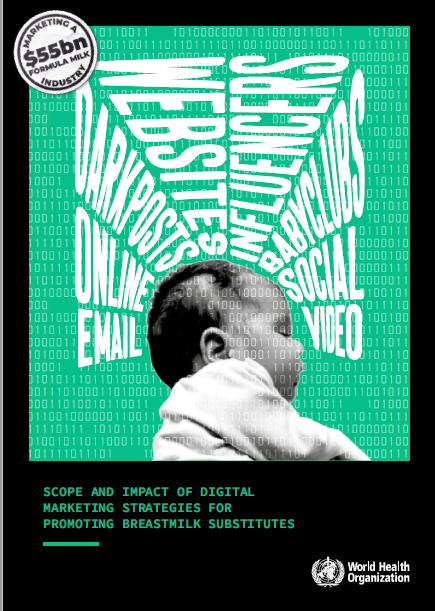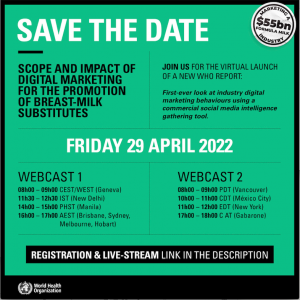NEW WHO report on the scope and impact of digital marketing for the promotion of breast-milk substitutes
click here for the report
Following on from the 8-country report (Marketing the $55 billion formula milk industry – How marketing influences our decisions on infant feeding) this is another important report from the World Health Organisation (WHO), exposing the predatory and insidious nature of digital marketing of breastmilk substitutes.
CLICK HERE for details of how to hear from technical experts about this review of evidence
Using algorithms and artificial intelligence, transnational baby food companies are targeting women with misleading tailored messages that present their products – many of which are not only unnecessary, but risky, flavoured and ultra-processed – as the solution to normal infant and young child feeding problems. They post messages on social media 46 times a month with each post reaching 40,000 users. Companies also enlist TRUSTED INFLUENCERS– celebrities whose posts are seen by 400,000 users: ‘On average, each post of a branded influencer promoting breastmilk substitutes is seen by around 400,000 people and generates action from around 11,000 of them. The most effective influencers can reach several million users with a single post.” (1)
Since 1981, IBFAN has been monitoring and exposing company practices that threaten child health and survival (2,3) and alongside WHO and UNICEF has been helping governments bring in strong, effective legislation based on the International Code of Marketing of Breastmilk Substitutes and the 19 subsequent, relevant World Health Assembly Resolutions.
These new WHO reports show the urgent need for ALL countries to adopt strong legislation, ensuring that national and global policy-setting is protected from commercial influence through effective transparency and Conflict of Interest safeguards.(4) While digital marketing presents particular challenges for monitoring and enforcement, major exporting countries have a responsibility to place legal constraints on the promotion tactics of their corporations, especially when they target poorly resourced countries.
CLICK HERE for WHO 8-country report launched in February 2022
___________________________________________________
(1) Annex to the Report by the Director General, Maternal, Infant and Young Child Nutrition. (EB150/23)
(2) Interference in public health policy: examples of how the baby food industry uses tobacco industry tactics This paper shows how the baby food industry uses all six tobacco industry interference tactics to shape global and national governance to suit their objectives: (1) manoeuvring to hijack the political and legislative process; (2) exaggerating economic importance of the industry; (3) manipulating public opinion to gain appearance of respectability; (4) fabricating support through front groups; (5) discrediting proven science; and (6) intimidating governments with litigation.
(3) Will the baby food industry get their way at Codex? Summary of what happened at the last Codex meeting in November 2021
(4) The baby food industry’s destruction of an irreplaceable natural resource. IBFAN Statement 5th Nov 2021


